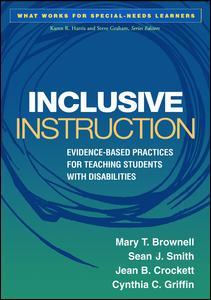Description
Inclusive Instruction
Evidence-Based Practices for Teaching Students with Disabilities
What Works for Special-Needs Learners Series
Authors: Brownell Mary T., Smith Sean J., Crockett Jean B., Griffin Cynthia C.
Language: English
Subjects for Inclusive Instruction:
56.31 €
In Print (Delivery period: 15 days).
Add to cartPublication date: 05-2012
220 p. · 17.8x25.4 cm · Paperback
37.68 €
In Print (Delivery period: 15 days).
Add to cartPublication date: 05-2012
224 p. · 17.8x25.4 cm · Paperback
Description
/li>Contents
/li>Readership
/li>Biography
/li>
This accessible book presents research-based strategies for supporting K-8 students with high-incidence disabilities to become accomplished learners. The authors clearly describe the core components of effective inclusive instruction, showing how to recognize and respond to individual students' needs quickly and appropriately. Teachers are provided with essential tools for managing inclusive classrooms; planning a curriculum that fosters concept development across content areas, promotes strategic learning, and builds fluent skill use; and integrating technology into instruction. Case examples illustrate ways that special and general education teachers can work together successfully to solve complex learning problems and improve outcomes for students who are struggling.
I. Recognizing Our Professional Responsibilities to Students and Understanding Their Needs 1. Recognizing Professional Responsibilities to Students with Disabilities in Inclusive Classrooms 2. Recognizing the Individual Needs of Students with High-Incidence Disabilities 3. Recognizing the Qualities of Successful Inclusive Teachers 4. Recognizing the Need for Collecting Meaningful Data II. Responding with Effective Instruction and Technology Supports 5. Planning Effective Classroom Instruction 6. Fostering Concept Development 7. Creating Strategic Learners 8. Building Fluent Skills Use 9. Managing Inclusive Classrooms, with Kristin Murphy 10. Using Evidence and Collaborative Inquiry Successfully in Inclusive Classrooms, with Elizabeth Filippi
Mary T. Brownell, PhD, is the Irving and Rose Fien Endowed Professor of Education and Director of the National Center to Inform Policy and Practice in Special Education Professional Development at the University of Florida. Over the course of her career, Dr. Brownell has focused her work on special education teacher quality and retention, teacher development through collaboration and Reading First coaching, education for teachers working with students with disabilities and other high-risk learners, and professional development in literacy for teachers of high-risk learners. She has published over 50 book chapters and articles and has been recognized by the University of Florida with two teaching and research awards. Sean J. Smith, PhD, is Associate Professor of Special Education at the University of Kansas in Lawrence. Dr. Smith’s background is in the area of special education and technology, and he has authored and presented a number of articles on the subject. He is also a project director for several U.S. Department of Education program initiatives on the integration of technology components into teacher preparation programs and classroom instruction for students with disabilities and on the development of a virtual social skills training experience for students with autism. Dr. Smith is an associate editor of Teaching Exceptional Children and has served as an associate editor of the Journal of Special Education Technology. Jean B. Crockett, PhD, is Professor and Director of the School of Special Education, School Psychology, and Early Childhood Studies at the University of Florida. Dr. Crockett’s research interests address the relationship between policy reform initiatives and the instruction of exceptional learners. She is the author of more than 40 publications on instructional programming and placement issues for students with disabilities; the conceptual, historical, and legal foundations of special education; and frameworks for conducting




